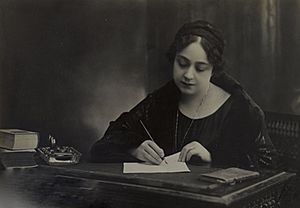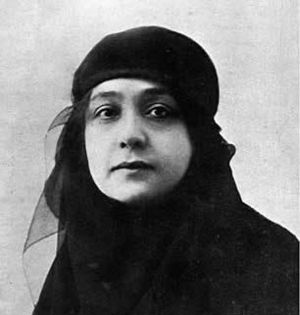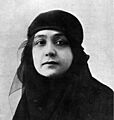Huda Sha'arawi facts for kids
Huda Sha'arawi (born Nour Al-Huda Mohamed Sultan Shaarawi; June 23, 1879 – December 12, 1947) was an important Egyptian leader. She was a pioneer for women's rights, a supporter of women's right to vote, and a nationalist who loved her country. She also started the Egyptian Feminist Union.
Contents
Early Life and Marriage
Huda Sha'arawi was born in Minya, a city in Upper Egypt. Her father, Muhamed Sultan Pasha Shaarawi, became the president of Egypt's Chamber of Deputies. Her mother, Iqbal Hanim, came from a region called the Caucasus.
Huda was educated at home with her brothers. She learned many subjects, including grammar and calligraphy, in different languages. She grew up mostly at home, as was common for upper-class Egyptian girls at the time. After her father passed away, her oldest cousin, Ali Shaarawi, became her guardian.
When she was thirteen, Huda married her cousin, Ali Pasha Sha'arawi. He was also in charge of her father's property. Later, she and her husband separated for a while. This gave her time to study more and experience some independence. She learned to read the Quran and studied Arabic and Islamic topics with female teachers in Cairo. Huda also wrote poems in both Arabic and French. She later wrote about her early life in her memoir, Mudhakkirātī, which means "My Memoir."
Standing Up for Egypt
The Egyptian Revolution of 1919 was a big protest led by women. They wanted Egypt to be free from British rule and for Egyptian leaders who had been arrested to be released. Important women like Huda Sha'arawi led these protests. Women from all walks of life joined in the streets with men.
Huda worked closely with her husband during the revolution. He was a leader in the Wafd Party, a political group. He kept her informed so she could take his place if he or other Wafd members were arrested. After the protests, the Wafdist Women's Central Committee (WWCC) was formed in 1920. Many women who protested joined this committee, and they chose Huda Sha'arawi as its first president.
In 1938, Huda and the Egyptian Feminist Union also helped organize a conference in Cairo. It was called the Eastern Women's Conference for the Defense of Palestine. This showed that they cared about national issues as much as women's rights. In 1945, she received a special award called the Order of the Virtues (Egypt).
Fighting for Women's Rights
In Huda's time, many women in Egypt were expected to stay at home or in a special part of the house called a harem. Huda felt this was a very old-fashioned way of life. She didn't like these limits on women's freedom. So, she started organizing talks for women on subjects they cared about. This was the first time many women left their homes to go to public places. Huda also convinced them to help her start a women's welfare group to raise money for poor women in Egypt. In 1910, she opened a school for girls. She focused on teaching them school subjects instead of practical skills like midwifery.
After her husband passed away in 1922, Huda made a brave decision. When she returned from a women's conference in Rome, she publicly removed her veil and headscarf. This was a very important moment for women's rights in Egypt. Women who came to greet her were surprised at first, but then they clapped. Some of them even removed their own veils and headscarves. Huda's decision was part of a larger movement of women seeking more freedom.
In 1923, Huda Sha'arawi founded the Egyptian Feminist Union and became its first president. This group wanted to change laws that limited women's personal freedoms, especially those about marriage, divorce, and who gets to raise children.
Even when she was young, Huda showed her independent spirit. She went into a department store in Alexandria to buy her own clothes, instead of having them brought to her home. She helped create the Mubarrat Muhammad Ali, a group that offered social services, in 1909. She also helped start the Intellectual Association of Egyptian Women in 1914. That same year, she traveled to Europe for the first time.
Huda helped lead the first street protest by women during the Egyptian Revolution of 1919. She was chosen as president of the Wafdist Women's Central Committee. She started holding regular meetings for women at her home, and this is how the Egyptian Feminist Union began. In 1925, she started a magazine called L'Égyptienne to share their ideas.
In January 1924, she led Egyptian women who protested at the opening of Parliament. They presented a list of demands for both national independence and women's rights. When these demands were ignored, she left the Wafdist Women's Central Committee. She continued to lead the Egyptian Feminist Union until she passed away. She also published the feminist magazine l'Egyptienne (and el-Masreyya). Huda represented Egypt at many women's conferences around the world, in cities like Graz, Paris, Amsterdam, Berlin, Marseilles, Istanbul, Brussels, Budapest, Copenhagen, Interlaken, and Geneva. She spoke about peace and stopping wars. Even though not all of her demands were met during her lifetime, she laid the groundwork for future gains for Egyptian women. She is still seen as a symbol of their fight for freedom.
Meeting with Atatürk
In April 1935, Huda Sha'arawi attended the Twelfth International Women Conference in Istanbul, Turkey. She was the president of the Egyptian group and one of twelve women. The conference chose Huda as the vice-president of the International Women’s Union. They also saw Atatürk, the leader of modern Turkey, as a role model.
Huda wrote in her memoirs about meeting Atatürk: "After the Istanbul conference, we were invited to a celebration held by Mustafa Kemal Atatürk, the liberator of modern Turkey... When it was my turn, I spoke directly to him without a translator. It was a special moment for an Eastern Muslim woman, standing for the International Women’s Authority. I gave a speech in Turkish, expressing how much Egyptian women admired and thanked him for the freedom movement he led in Turkey. I said: 'This is the ideal, oh elder sister of the Islamic countries.' He encouraged all the countries of the East to seek freedom and women's rights. I said: 'If the Turks call you Atatürk, meaning 'Father of the Turks,' I say that is not enough. You are for us 'Atasharq,' meaning 'Father of the East.'" She said he thanked her very much for her words. Then, she asked him for a picture to publish in her magazine, L'Égyptienne.
Helping Others
Huda Sha'arawi was involved in many projects to help people throughout her life. In 1909, she started the first charity group run by Egyptian women, called Mabarrat Muhammad 'Ali. This group offered social services for poor women and children. She believed that women running such projects was important for two reasons. First, it would help women learn more, gain practical skills, and focus on the world outside their homes. Second, it would challenge the idea that women were only meant for pleasure or needed constant protection.
Huda believed that the problems of the poor should be solved by rich people giving to charity, especially for education. She saw poor women as people who would receive help, not as people who should be asked about their needs or goals. She thought the rich were the "guardians and protectors of the nation."
Tributes
Huda Sha'arawi is featured in the song 'The Lioness' by English singer-songwriter Frank Turner. This song is on his 2019 album, No Man's Land.
On June 23, 2020, Google celebrated her 141st birthday with a special Google Doodle on their homepage.
Images for kids
See also
 In Spanish: Huda Sha'arawi para niños
In Spanish: Huda Sha'arawi para niños
 | Kyle Baker |
 | Joseph Yoakum |
 | Laura Wheeler Waring |
 | Henry Ossawa Tanner |




